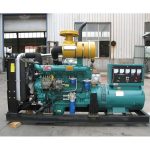Introduction
In today's world, where power outages are becoming more frequent due to various reasons such as extreme weather conditions, aging infrastructure, and increased demand on the grid, having a reliable backup power source is essential for residential properties. 150kw diesel generator for remote monitoring stations are a popular choice for homeowners looking to ensure uninterrupted power supply during emergencies. In this comprehensive guide, we will explore the benefits, considerations, and best practices for using diesel generators in residential settings.
Chapter 1: Understanding Diesel Generators
Diesel generators are a type of backup power source that operate using diesel fuel to generate electricity. They are commonly used in residential, commercial, and industrial settings to provide power during outages or when grid electricity is unavailable. Diesel generators consist of an engine that runs on diesel fuel and an alternator that converts the mechanical energy generated by the engine into electrical power.
One of the key advantages of diesel generators is their reliability and durability. Diesel engines are known for their robust construction and ability to operate continuously for long periods of time. This makes diesel generators ideal for use as backup power sources in residential settings where reliability is paramount.
Chapter 2: Benefits of Diesel Generators for Residential Use
There are several benefits to using diesel generators for residential backup power, including:

1. Reliability: Diesel generators are known for their reliability and can provide continuous power for extended periods of time. This is especially important during emergencies when grid electricity may be unavailable for an extended period.
2. Fuel efficiency: Diesel engines are more fuel-efficient than gasoline engines, which means that diesel generators can provide more power for longer durations using less fuel.
3. Durability: Diesel engines are built to withstand heavy use and operate in harsh conditions, making them ideal for residential use where they may need to run for extended periods during power outages.
4. Low maintenance: Diesel generators require less maintenance compared to other types of generators, reducing the overall cost of ownership for homeowners.
5. Power output: Diesel generators can provide higher power output compared to other types of generators, making them suitable for powering a wide range of appliances and devices in a residential setting.
Chapter 3: Considerations for Installing a Diesel Generator
Before installing a diesel generator for residential use, there are several important considerations to keep in mind:
1. Sizing: It is essential to determine the power requirements of your home to select the right size diesel generator. A professional electrician can help you calculate the load requirements and recommend an appropriately sized generator.
2. Location: Diesel generators should be installed in a well-ventilated area away from living spaces to prevent the buildup of toxic fumes. It is also important to consider noise levels and ensure that the generator is placed in a location where noise will not be a nuisance to residents or neighbors.
3. Fuel supply: Diesel generators require a steady supply of diesel fuel to operate. It is essential to have a reliable source of fuel and ensure that the generator is refueled regularly to avoid running out of fuel during an emergency.
4. Maintenance: Regular maintenance is essential to ensure the reliable operation of a diesel generator. This includes regular oil changes, filter replacements, and inspection of critical components to identify and address any issues before they lead to a breakdown.
Chapter 4: Best Practices for Operating a Diesel Generator
To ensure the safe and efficient operation of a diesel generator in a residential setting, it is important to follow these best practices:
1. Regular maintenance: Follow the manufacturer's recommended maintenance schedule to keep the generator in good working condition. This includes checking oil levels, replacing filters, and inspecting components for signs of wear or damage.
2. Run the generator regularly: To ensure that the generator is ready to operate when needed, it is important to run it regularly to prevent fuel degradation and keep the engine components lubricated.
3. Monitor fuel levels: Keep track of fuel levels and ensure that the generator is refueled before running out of fuel. It is also important to use clean, high-quality diesel fuel to prevent damage to the engine.
4. Invest in a transfer switch: A transfer switch is a critical component that allows the generator to automatically switch on when grid power is lost. This ensures a seamless transition to backup power without the need for manual intervention.
Chapter 5: Safety Precautions for Using a Diesel Generator
While diesel generators are safe and reliable backup power sources, it is important to follow these safety precautions when using them in a residential setting:
1. Proper ventilation: Diesel generators produce carbon monoxide, a colorless and odorless gas that can be deadly if inhaled in high concentrations. It is essential to install the generator in a well-ventilated area and never operate it indoors or in enclosed spaces.
2. Grounding: Ensure that the generator is properly grounded to prevent the risk of electrical shocks and fires. Follow the manufacturer's guidelines for proper grounding and ensure that all electrical connections are secure.
3. Fire safety: Diesel generators can get hot during operation, increasing the risk of fire. Keep flammable materials away from the generator and have a fire extinguisher on hand in case of emergencies.
4. Electrical safety: Do not overload the generator by connecting too many appliances or devices. Make sure to use heavy-duty extension cords and avoid connecting the generator directly to your home's electrical system without a transfer switch.
Conclusion
Diesel generators are an excellent choice for residential backup power due to their reliability, durability, and fuel efficiency. By understanding the benefits, considerations, best practices, and safety precautions outlined in this guide, homeowners can make informed decisions when installing and operating a diesel generator for their homes. With proper maintenance and attention to safety, a diesel generator can provide peace of mind and ensure uninterrupted power supply during emergencies.
